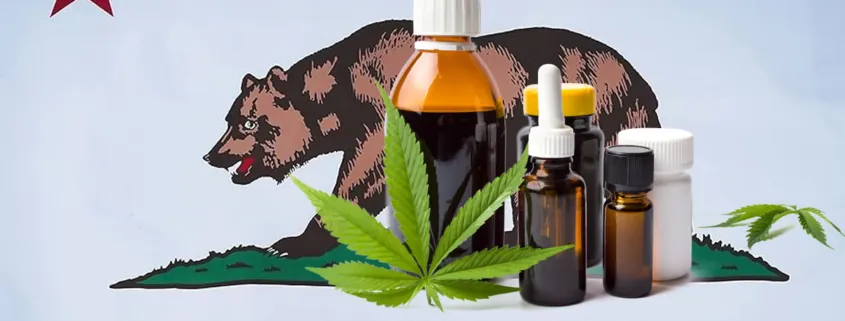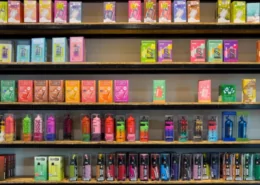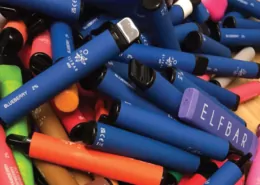California Cannabis Industry Adapts to New Vape Law
A new California law that took effect on July 1 has prompted cannabis brands and retailers to adjust their vape packaging and disposal practices. The legislation, codified in California Business and Professional Code 26152.1, bans the use of the term “disposable” in advertising, labeling, and marketing of marijuana vape products. It also mandates that THC oil, vape pens, and batteries be disposed of at hazardous waste collection facilities or other approved businesses.
CHAPTER 15. Advertising and Marketing Restrictions [26150 – 26156]
(a) (1) Advertisement and marketing of an integrated cannabis vaporizer, as defined in Section 26122, shall prominently provide in a clear and legible fashion: “An empty integrated cannabis vaporizer shall be properly disposed of as hazardous waste at a household hazardous waste collection facility or other approved facility.”
(2) Advertisement and marketing of a cannabis cartridge shall prominently provide in a clear and legible fashion: “A spent cannabis cartridge shall be properly disposed of as hazardous waste at a household hazardous waste collection facility or other approved facility.”
(3) For the purposes of this subdivision, “authorized facility” means a facility authorized under the hazardous waste control laws under Chapter 6.5 (commencing with Section 25100) of Division 20 of the Health and Safety Code.
(b) Advertisement and marketing of a cannabis cartridge and an integrated cannabis vaporizer shall not indicate that a cannabis cartridge or an integrated cannabis vaporizer is disposable nor imply that it may be thrown in the trash or recycling streams.
(c) This section shall become operative on July 1, 2024.
Industry Responses and Initiatives
Retailer Perspective
Perfect Union, a Sacramento-based company operating nine stores primarily in Northern California, has taken steps to educate customers on proper vape disposal. Angelica Sanchez, the company’s senior director of government affairs and compliance, emphasized the importance of treating these products as hazardous waste rather than normal waste. To provide convenience for customers, Perfect Union is installing vape-disposal boxes at its stores throughout the state.
Brand Perspective
Final Bell Holdings, a Los Angeles-based company that provides supply-chain services for California and Canadian brands, is assisting its industry customers in updating existing packaging or creating new labels to comply with the new law. Jeremy Green, the company’s CEO and co-founder, noted that consumers currently lack dedicated recycling solutions for cannabis products, particularly vaporization products.
Mammoth Distribution, the distributor of Heavy Hitters, one of the top-selling vape products in California, aligned its product packaging months ago to meet the new compliance standard. Wesley Hein, head of global brand expansion at Mammoth Distribution and president of the California Distribution Association, stated that the company has been progressively incorporating the bill’s language into its marketing and education materials.
Sustainable Initiatives in the Industry
Some brands, such as Pax Labs, are incorporating more sustainable components into their devices. The San Francisco-based company recently released its first vape device made with reclaimed and recycled ocean-bound plastic. Scott Collins, Pax Labs’ senior director of hardware product and design, emphasized the importance of responsible consumption and disposal, likening the treatment of vape products to that of other consumer electronics containing lithium-ion batteries. He also highlighted the benefits of reusable pen and pod platforms in terms of durability and reducing the environmental impact of vape products.
California’s Role in Setting Environmental Standards
California has long been a leader in setting domestic environmental policy and sustainability initiatives. The vape law is part of a broader effort to improve sustainable disposal practices for cannabis vaping products while reducing the risk of safety hazards associated with battery-operated devices. Cannabis attorney Paula Savchenko noted that licensed cannabis companies will play a crucial role in decreasing fires in the state’s materials-management systems, thanks to the support of the state’s cannabis industry leaders.
Challenges in Enforcement and Disposal Solutions
Enforcing the new regulation may prove difficult for California’s Department of Cannabis Control (DCC), which is currently grappling with a growing pesticide scandal in the marketplace. Dustin Robinson, a Florida-based cannabis business attorney, questions the impact of the law without a widespread and convenient solution for electronic waste disposal and a program of consumer education.
Conclusion
As California’s cannabis industry adapts to the new vape law, brands and retailers are implementing various initiatives to ensure compliance and promote sustainability. While challenges remain in terms of enforcement and disposal solutions, the industry’s efforts to educate consumers and incorporate more sustainable practices represent a step in the right direction. As California continues to set the standard for environmental policy, the cannabis industry’s response to this new law will likely serve as a model for other states considering similar legislation.
Source: California cannabis operators pivot to comply with new vape law
- Malaysia Negeri Sembilan Backs Vape Ban, Awaits Clear Laws - August 5, 2025
- Is It Illegal to Vape or Smoke While Driving in Massachusetts? - August 5, 2025
- Austria Plans to Ban Disposable E-Cigarettes - August 5, 2025








